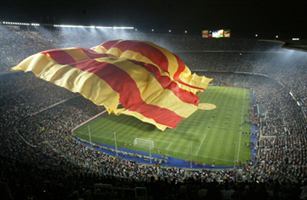
Provincial Pride A giant Catalan flag is unfurled at FC Barcelona's Camp Nou stadium
Forty-five million Spaniards drew a collective breath at the news on May 2 that Xavi, the playmaking genius of FC Barcelona, was carrying an injury that might prevent him from playing in South Africa this summer for Spain's national team. His club coach said Xavi, 30, had a 3-cm rip just above his left calf muscle; if aggravated, the tear would require surgery, ruling him out of the World Cup. But with the Spanish league in its final stretch and Barça needing victories to stay ahead of archrival Real Madrid, Xavi opted to keep playing. "He is committed to this club," coach Pep Guardiola said at a press conference. "He is an example for everyone."
Not everyone was pleased by Xavi's devotion to his club. "I thought to myself, We don't need him to be an example. We just need him to be fit for South Africa," says Sergio Soto, a pharmacist's assistant in Madrid. "Because without Xavi, our World Cup dream is finished."
Spain had to wait a nerve-racking week before it could breathe easy. Xavi (few fans know his full name: Xavier Hernández i Creus) played his last game of the season for his club on May 8 and emerged without further injury. Speaking to TIME shortly afterward at Barça's training complex outside the city, Xavi says his countrymen needn't have been on tenterhooks. "I know my own body," he says. "People all over Spain were worried, but I'm all right."
It's not unusual for soccer-crazed nations to get exercised over the well-being of their star players — all of England winced at Wayne Rooney's groin strain, and Germany felt the pain of the egregious tackle that ended Michael Ballack's Cup hopes. But Spain's agonizing over Xavi tells a deeper story, one of soccer rising above politics and bridging ancient divides.
Xavi is from Catalonia, the northeastern province washed by the Mediterranean that historically has had an uneasy relationship with the rest of Spain. Many Catalans see themselves as a separate nation and dream of independence. They speak their own language, Catalan, which sounds to the untrained ear like an admixture of Spanish, French and Portuguese. And like their Basque neighbors, they have a culture and history that have been often at odds with those of other regions of Spain. During the Franco dictatorship, authorities in Madrid sought to stamp out the Catalan identity, often by bloody force. The dictator favored Real Madrid, sowing the seeds for one of soccer's most bitter rivalries.
In turn, many Spaniards have long regarded Catalans with distrust. In soccer, that translates into a frostiness toward Catalan players, a suspicion that they don't play for the national colors with the same enthusiasm as they do for FC Barcelona, a club so closely linked to the Catalan identity that its crest includes the Catalan flag. Barça's slogan, "Més que un club" (More than a club), hints at its political role. Some Spaniards blame generations of Catalan players for the fact that the national team has never won the World Cup despite fielding world-beating talent every four years. During the 2006 Cup, Spain flamed out to France even before the quarterfinals.
And yet in South Africa this year, the hopes of the Spanish national team — known as La Furia Roja, or the Red Fury — rest on a group of Catalan players: Xavi, Cesc Fabregas and Sergio Busquets in midfield and Carles Puyol and Gerard Piqué in defense. (Goaltender Victor Valdés is also on the squad bound for South Africa, along with three non-Catalan players from Barça: Andrés Iniesta, Pedro Rodríguez and the club's latest signing, David Villa.) The Catalan contingent, products of Barça's vaunted youth system, has helped the national team sweep all before it in the past four years, becoming European champions and flying up the FIFA national rankings from 12th to first, before being overtaken by Brazil. Now, thanks to the Catalan stars, La Furia Roja will travel to South Africa as favorites to win the tournament. "Catalan players do their best in the national team, and we are proving that," says Piqué, 23.
In that time span, Barça has won three Spanish league titles and two European championships. "This is Catalonia's golden generation of players," says Marc Ingla, a former marketing chief at Barça and a candidate for the club's presidency in elections this month. "Both the club and the country have benefited from these riches."
For the players, the distinction is unimportant. "A footballer doesn't understand politics. What he wants to do is win," says Xavi. Says Piqué: "As a player, your dream is to play in the national shirt and defend it against the world."
But Xavi and company can't expect all their fellow Catalans to see it that way. For some Barça fans, the only "national" team is a collection of Catalan all-stars that plays occasional exhibition games in the region's colors. "One day we will send a Catalan team to the World Cup," says Xavier, a university student who refused to give his last name. "Until that day, that tournament means nothing to me."
That sentiment is shared by the club's top official. Joan Laporta's highly successful seven-year presidency at Barça ends this month. He and Ingla have done more to turn the club into an international soccer powerhouse, with an annual budget in excess of $500 million and hundreds of millions of fans around the globe. "Barça belongs to the world," says Laporta. "Barça is Japanese, it's African, it's American." But is it Spanish? Laporta pauses for thought, then shrugs. "I have no emotion for the [Spanish] national team," he says. "It doesn't matter if six of my players are in it." Some divides not even soccer can bridge.